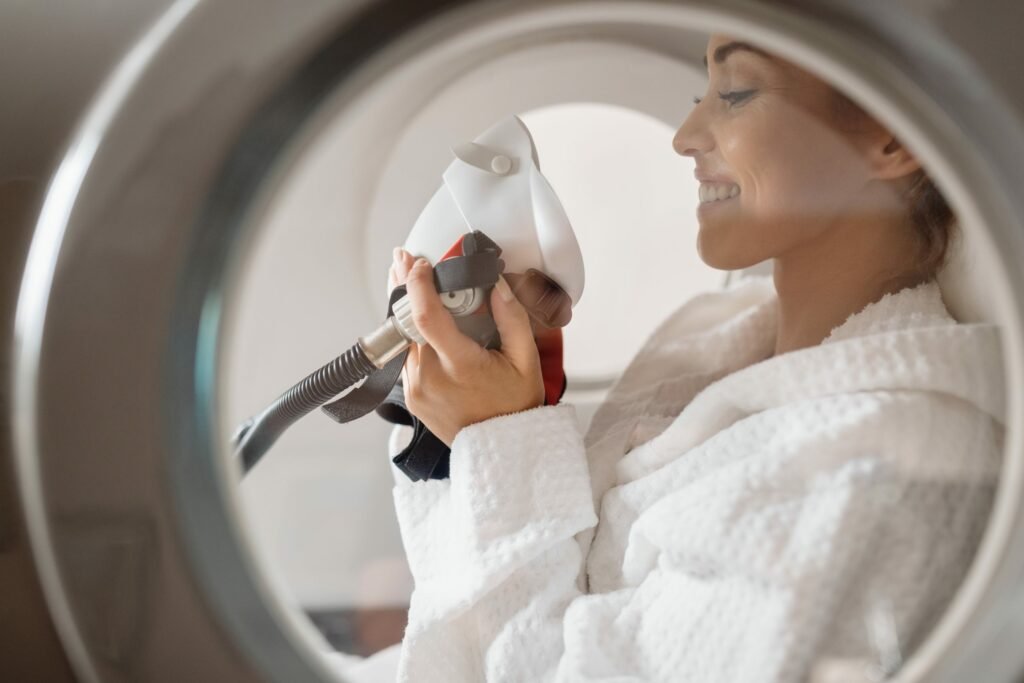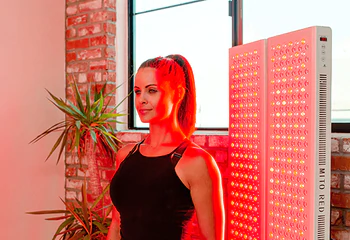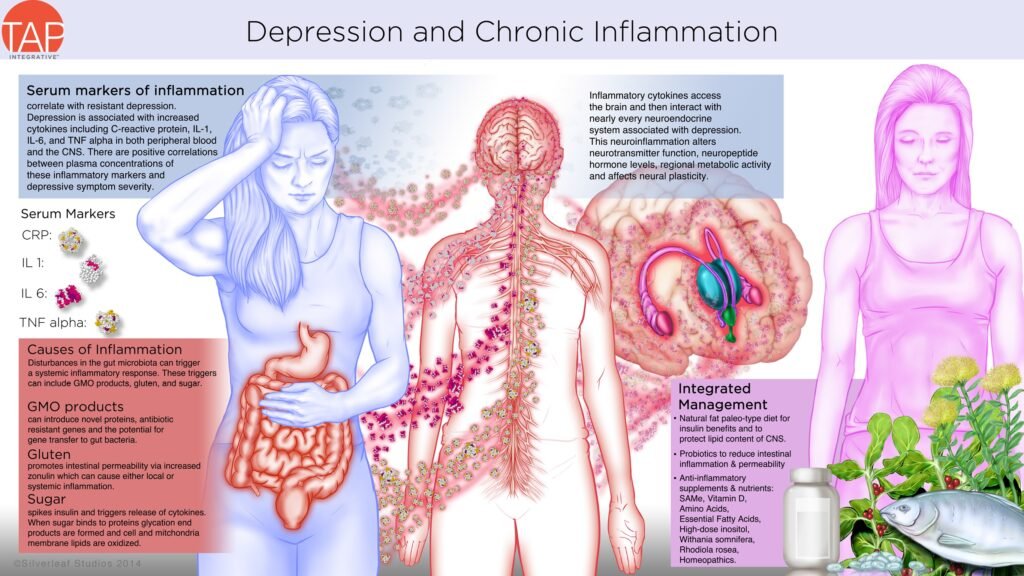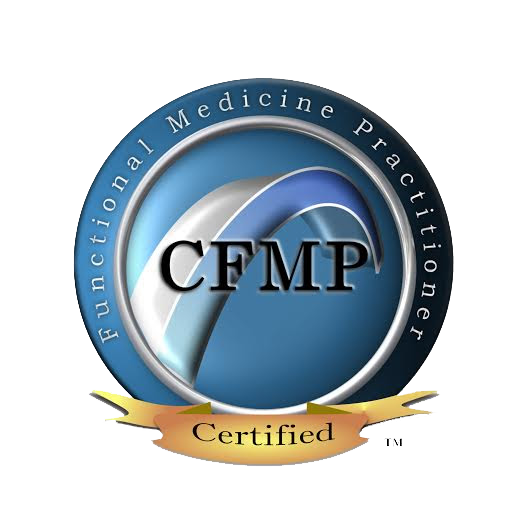
In February 2021, 40.8% of adults in Arizona reported symptoms of anxiety or depression. While healthcare providers commonly use traditional treatments such as medication, these interventions often provide slow relief and prove ineffective in addressing the cognitive decline associated with depression. Both providers and patients have been looking for something that will work much better and more quickly the traditional pharmaceuticals alone.
In our office we combine different safe and effective treatments to help patients dealing with anxiety and depression. These treatments are Hyperbaric Oxygen therapy, Red Light therapy and Functional Medicine.
The Impact of Hyperbaric Therapy for Depression
Emerging research suggests that hyperbaric oxygen therapy (HBOT) may offer a novel and promising approach to alleviate depressive symptoms and improve cognitive function. In this article, we explore the benefits of hyperbaric oxygen therapy for depression, drawing insights from notable studies in the field.
Hyperbaric oxygen therapy (HBOT) involves the administration of pure oxygen in a pressurized chamber. This allows the patient to breathe in oxygen at levels higher than atmospheric pressure. The increased pressure allows the lungs to intake more oxygen, which then dissolves into the bloodstream and circulates throughout the body.
Inside the hyperbaric chamber, patients lie down comfortably and breathe in a high concentration of oxygen. Trained professionals carefully control and monitor the gradual increase of pressure in the chamber, reaching levels two to three times higher than normal atmospheric pressure, in order to ensure the safety and well-being of the patient.
The increased pressure and higher oxygen levels in HBOT have profound effects on the body’s physiology. The enhanced oxygen concentration in the bloodstream promotes oxygenation of tissues and organs, even in areas with restricted blood flow.
Although studies exploring the use of HBOT for depression are relatively limited, the initial findings present encouraging results.
Studies on Hyperbaric Therapy for Depression
A study comparing antidepressant medication (escitalopram) alone and with HBOT for depression and the cognitive function. Medication often fails to improve cognitive issues such as impaired executive function, inattention, memory decay, and delayed reaction time.
In this study, researchers randomly selected 35 patients for each group.
Both groups received medication, but one group additionally underwent HBOT sessions five times a week for six weeks. The researchers assessed the severity of depression and cognitive function for both groups before the commencement of treatment and at two, four, and six weeks after the treatment period.The results suggested that escitalopram combined with HBO was superior to escitalopram alone in the treatment of depression and can act earlier in depressive patients and effectively improve their cognitive function.
A study conducted by Boussi-Gross et al. (2013) examined the effects of HBOT on individuals with post-concussion syndrome, a condition often associated with depression. The results showed significant improvements not only in cognitive function but also in depressive and anxiety symptoms. This suggests that the increased oxygen levels delivered through HBOT may have a positive impact on mood regulation and overall well-being.
In a trial by Yuly Bersudsky (2022), 51 patients were studied in a double-blind randomized study. In the group receiving enriched oxygen treatment, 69% of participants showed improvement over a 4-week period, whereas only 23% of the control group improved. The enriched oxygen treatment led to benefits in depressive and anxiety symptoms, as well as in “cognitive disturbance,” such as reduced suicidal thoughts, guilt, and insomnia. No significant side effects were observed among the study participants.
While not directly focused on depression, a study by Hadanny et al. (2020) explored the effects of HBOT on neurocognitive functions in post-stroke patients. Remarkably, they observed a reduction in depressive symptoms among participants who underwent HBOT. This suggests that HBOT may have a broader positive impact on mood and emotional well-being.
The Mechanisms Behind HBOT’s Effects on Depression
The precise mechanisms by which HBOT exerts its effects on depression are not yet fully understood. However, increased oxygen levels delivered through HBOT may enhance oxygenation in brain tissues, which can have several beneficial effects. Improved oxygen supply may support the regeneration of damaged brain cells, enhance neuroplasticity, and modulate neurotransmitter activity, all of which can contribute to mood stabilization and alleviate depressive symptoms.
Hyperbaric Oxygen Therapy for Depression
Hyperbaric therapy offers a potentially groundbreaking approach in the realm of depression treatment. Although research on the use of HBOT for depression is still in its early stages, the studies conducted thus far provide encouraging evidence of its positive effects on depressive symptoms. By harnessing the power of increased oxygen levels, HBOT may help restore brain function, improve neurocognitive outcomes, and alleviate depressive symptoms.
As the field of hyperbaric therapy continues to advance, further research and clinical trials are necessary to explore its full potential in treating depression. With ongoing investigation, we may uncover new possibilities and expand the range of therapeutic options available to those grappling with this challenging condition.

Using Photobiomodulation with Hyperbaric Oxygen Therapy for Depression
Photobiomodulation (PBM), also known as Red Light Therapy, combined with Hyperbaric Oxygen Therapy is a new approach for treating depression. PBM uses red and near-infrared light to make cells work better, while HBOT increases the amount of oxygen in the body with a pressurized chamber. By using both PBM and HBOT together, the therapies aim to address the physical and chemical imbalances that contribute to depression.
PBM helps cells function better and reduces inflammation, which is often linked to depression. HBOT increases oxygen to the brain, which is important for proper brain function and the regulation of chemicals that affect mood. By using PBM and HBOT together, the therapy may have a stronger and more comprehensive effect on depression.
Both therapies are safe and have no side effects when used properly. PBM and HBOT as a new way to treat depression offers hope for those seeking alternatives to traditional medication-based treatments.
Functional Medicine for Depression
Functional medicine focuses on finding and fixing the underlying physiologic causes of depression. There are several problems in the body that can contribute to depression. With the right testing we can identify these problems and correct them.
Neurotransmitter Imbalance
Out of balance neurotransmitters can cause depression. Neurotransmitters are amazing chemicals your body produces which relay information between nerve cells and other cells in the body. They include two inhibitors, serotonin and GABA, and also four exciters: dopamine, norepinephrine, epinephrine and glutamate. An imbalance of any of these can cause depression. If you want to treat depression without medication you need to know which neurotransmitters are out of balance.
Intestinal Inflammation

The intestines are commonly referred to as “the second brain.” The inner lining of the intestines and the brain are made of similar tissue. Both the brain and the intestine produce serotonin. Intestinal inflammation can actually cause depression. When the intestines are inflamed, the brain is inflamed. Chronic inflammation of the brain interferes with the ability of the brain cells to communicate, and can cause depression, brain fog, insomnia, ADD, Alzheimer’s disease, anxiety, autism or fatigue. “What are the signs of an inflamed intestine?” you ask. Great question! Constipation, diarrhea, bloating, acid reflux, and cramps are signs of inflammation, but it’s also possible to have inflamed intestines without any of these symptoms. I explain the details of most common intestinal inflammation conditions in these articles:
What Causes Irritable Bowel Syndrome?
Hiatal Hernia Causes and Nondrug, Nonsurgical Treatment
Thyroid Dysfunction
It’s estimated that low thyroid hormones are responsible for 10 to 15% of cases of depression. Without a proper thyroid work up, treating depression without medication is not possible. When the thyroid not working right, a person feels like their get-up-and-go got up and left. Doctors often fail to diagnose many cases of hypothyroidism because they only check the thyroid-stimulating hormone (TSH). To accurately assess the thyroid, the following tests must be conducted:
- Thyroid-stimulating hormone (TSH)
- Free serum thyroxine (fT4)
- Free triiodothyronine (fT3)
- Reverse T3 (rT3)
- Anti-thyroglobulin antibodies (anti-TG)
- Anti-thyroid peroxidase antibodies (anti-TPO)
Furthermore, even folks who are taking Synthroid (a T4-only thyroid medication) for a low thyroid can still suffer from depression because the body has to turn the T4 into T3, the active form of thyroid hormone.
Adrenal Dysfunction
There is one adrenal gland located on top of each kidney. These glands make some really important hormones and neurotransmitters. I already explained the connection between adrenaline and noradrenaline and the adrenal glands.
In addition to adrenaline and noradrenaline, the adrenal glands produce cortisol and DHEA. During times of stress, healthy adrenal glands produce more cortisol, DHEA, and noradrenaline to prepare us to deal with the crisis.
The problem arises when our lives are filled with stress, and our adrenal glands continuously produce these hormones in response to stress. This excessive response often leads to anxiety, insomnia, loss of libido, and weight gain.
If the stress persists, the adrenal gland’s response will eventually decrease, resulting in insufficient production of cortisol, DHEA, and noradrenaline. This insufficiency can lead to symptoms such as depression, fatigue, lethargy, and indifference.
Diet
If you want to address depression without relying on medication, it is crucial to pay attention to your diet. Diets high in carbohydrates and low in fats can contribute to depression.
It is widely recognized that consuming processed, sugary junk food is detrimental to health and can lead to various problems, including depression. However, what may surprise many people is that following a “healthy” low-fat, high-carbohydrate diet, as advocated by the government and medical experts, can create an unfavorable biochemical foundation for depression.
There are several issues associated with this type of eating pattern. Firstly, a low-fat, high-carbohydrate diet results in fluctuating blood sugar levels throughout the day. These constant spikes and drops in blood sugar not only contribute to feelings of depression but also contribute to weight gain, mental fog, and fatigue, among other issues.
Furthermore, a poor diet can lead to nutrient deficiencies. When the body lacks essential nutrients such as magnesium, zinc, vanadium, vitamin D, B12, folate, and essential fatty acids, it is only a matter of time before a person is likely to experience depressive symptoms.
Fixing depression without medication will always require eating a nutrient dense diet high in healthy fats. Sometimes testing is needed to determine if there are dire nutrient needs.
Often fixing depression without medication requires fixing the adrenal glands. You can get more information on fixing adrenal problems in this article:
Adrenal Fatigue can make you FAT, TIRED, LIBIDO-LESS, CONSTIPATED AND SICK.
HBOT Packages for Depression
We have a diverse range of hyperbaric packages, carefully tailored to meet your needs. One notable offering is our Mental Health Package, specifically designed to bring together HBOT, PBM and Functional Medicine. This package comes with 10 combination HBOT and PBM sessions, as well as a Neurotransmitters & Hormone test – $500 value! In total, this package is $1,975 and will save you $275.
We also provide HBOT packages with and without PBM. If you’re not sure what is best for you, please contact our office at (602) 864 – 0304 and we can help you get the package that is right for you. Whether you choose an option with or without PBM, or all packages offer unique benefits.
Hyperbaric Oxygen Therapy near Me
Our office is located on 27th and Glendale Ave in Phoenix, Arizona. As of September 2023, we are equipped with multiple chambers, expert staff, and, additionally, Photobiomo What Causes Irritable Bowel Syndrome? dulation (also known as Red Light Therapy) panels to fully help you achieve your optimal wellness.



